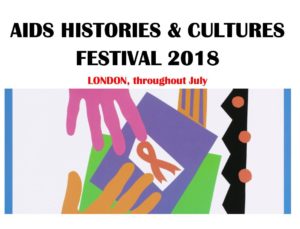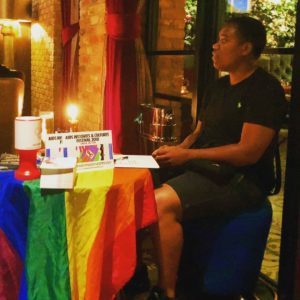by Emili Ema Sedlar July 13, 2018: Imagine a festival that focuses on how AIDS has been portrayed and represented throughout the past three decades. And more than that, it presents and showcases talented artists who paint a picture of a particular period of time when people living with HIV struggled tremendously in society, comparing that period with today and asking the audience: Has stigma changed? What more needs to be done?
July 13, 2018: Imagine a festival that focuses on how AIDS has been portrayed and represented throughout the past three decades. And more than that, it presents and showcases talented artists who paint a picture of a particular period of time when people living with HIV struggled tremendously in society, comparing that period with today and asking the audience: Has stigma changed? What more needs to be done?
This year in London, for the first time, the AIDS Histories and Cultures Festival will introduce the history of AIDS through poetry, music, plays, visual arts, performance, film screenings, educational talks and much, much more. The Festival kicked off July 1 and will continue holding events throughout July.
The goal of the festival is to inform, educate and raise awareness on the way AIDS has been seen throughout the epidemic and how things have changed since the 1980s, from activism to acceptance. Dr. Janet Weston, one of the festival’s key organizers, spoke with us about why this festival was created and what makes it so special and distinct from other festivals.
One of the reasons why this festival came about was that many organizers and volunteers realized how it was crucial to talk about and even represent the history of AIDS, which is so rich in its content when people look at different concepts and activists that have left an indelible mark on history and our current times.
“We were becoming aware of a lot of interest in AIDS as a historical phenomenon – things like 120 BPM, or David France’s How to Survive a Plague, as well as engagement from academic historians, new oral histories, new artworks and exhibitions popping up, archives and museums revisiting their AIDS collections, and so on, all reflecting back on 30 years of AIDS. At the same time, though, the crisis of the 1980s and 90s is receding from popular memory, and AIDS remains a serious issue worldwide,” explained Weston.
The festival has already gained significant mention on social media channels and has even had great coverage from BBC World Service! Weston noticed how many people have reacted positively to the event and have asked questions about the artists, who are extremely unique in their performance and their own individual portrayal of the epidemic.
 “The very first event, on July 1, was a Poetry LGBT open mic night hosted by Andreena Leeanne, and it was a huge success. The most amazing thing has been just how many people, charities, heritage organizations, and businesses have been willing to get on board and support a brand new festival,” said Weston.
“The very first event, on July 1, was a Poetry LGBT open mic night hosted by Andreena Leeanne, and it was a huge success. The most amazing thing has been just how many people, charities, heritage organizations, and businesses have been willing to get on board and support a brand new festival,” said Weston.
One of the special guests of the festival will be Dr. Joseph Sonnabend, a musician who wrote music at the height of the battle against AIDS in New York City while working as a doctor. “Dr. Sonnabend will be there in person, in conversation with Sean Strub [founder of the Sero Project],” revealed Weston. Ash Kotak, who leads #AIDSMemory UK, has also worked intensively on the Festival.
Weston hopes that the outcomes of the festival will have a huge impact on attendees, and that people will become more curious and learn more about this vital topic. “We want people to be entertained, enlightened, and inspired. Hopefully, everyone involved will take away a heightened awareness of HIV issues that affect us all – past, present, and future,” Weston emphasized.


